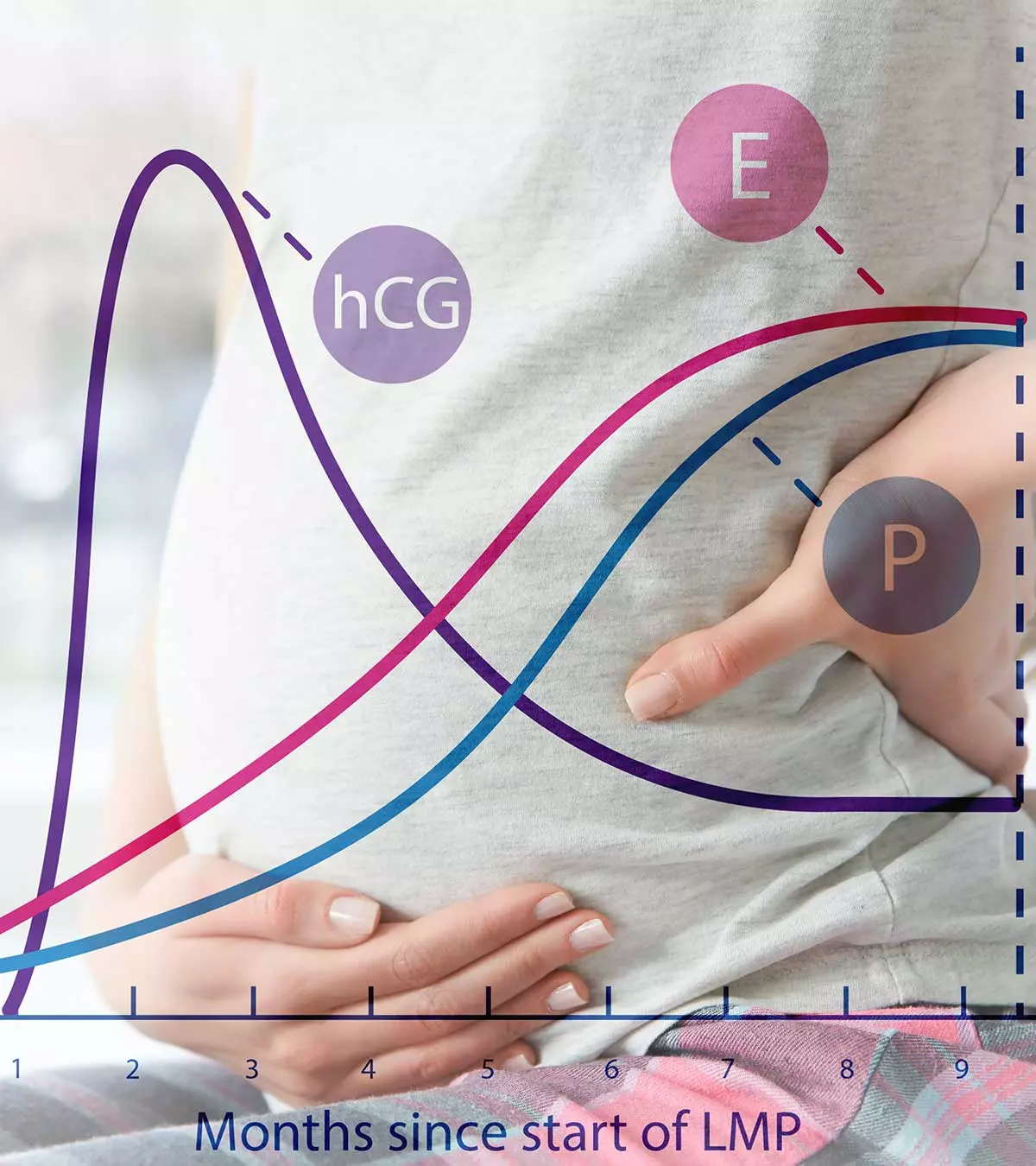
Image: ShutterStock
Mood swings, food cravings, tiredness, and morning sickness are some common pregnancy symptoms triggered by hormonal changes in the body. Progesterone is one of the major pregnancy hormones that plays an essential role in the woman’s body. The levels of progesterone during pregnancy keep fluctuating, which can result in several physical changes. Knowing these fluctuations can help you understand its impact on pregnancy and fetal development. Are you keen on knowing what happens when the progesterone levels rise or fall? In this post, we tell you about the role of progesterone throughout the nine months of gestation, how to control and improve its levels, the side effects of excessively high or low progesterone levels during pregnancy, and prevention measures.

Key Pointers
- Progesterone is a sex hormone that regulates the menstruation and reproductive cycle in women.
- It promotes the growth of blood vessels and thickens the uterine lining to receive the fertilized egg.
- It relaxes the uterine muscles to prevent contractions during pregnancy and stimulates milk production while breastfeeding.
- High progesterone levels during pregnancy can lead to fatigue, bloating, anxiety, and low sex drive.
- Low progesterone levels can cause irregular periods, mood swings, and recurrent loss of pregnancy.
- Progesterone supplements may also be prescribed by a doctor as part of fertility treatment for women.
What Is Progesterone?

Progesterone is a hormone that controls menstruation and fertility. The luteinizing hormone causes the release of this hormone by the corpus luteum or the temporary endocrine glandiComponents of the endocrine system that are involved in the production of hormones crucial for several body functions formed at the site of an ovarian follicleiSmall fluid-filled sac located in the ovary that holds immature eggs and is involved in the release of crucial reproductive hormones . The hormone is produced after ovulation or after the discharge of eggs from the ovaries.
If you conceive, progesterone helps to prepare the lining of the uterus for implantation and then maintains it throughout the pregnancy (1). If you don’t conceive, the endocrine gland breaks down and reduces the progesterone levels, resulting in menstruation.
How Does Progesterone Help Before And During Pregnancy?
Progesterone plays an essential role in preparing and maintaining the endometrium (membrane lining of the uterus), thereby aiding the fetus’ survival (2) (3).
- During the luteal phase (the phase after ovulation in a menstrual cycle), the hormone promotes the growth of blood vessels and activates the secretion of the endometrial glandiTubular glands of the uterus that play a significant role during pregnancy and the menstrual cycle . This thickens the lining of the uterus to accept and nourish the fertilized egg.
- During pregnancy, the hormone creates a suitable environment for embryo development and growth. It also promotes relaxation of uterine muscles to prevent contractions.
- Even during lactation, progesterone stimulates milk-producing cells in the breast to produce milk.
Progesterone plays a vital role in the functioning of the woman’s reproductive cycle.
Also, progesterone influences endometrium secretory changes, maintains pregnancy, and reduces uterine contractions. Hence, it is essential to have balanced levels of progesterone in the body.
What Happens If Progesterone Levels Are High During Pregnancy?

Hormonal balance is essential for the body to function properly. High levels of progesterone typically don’t cause any negative health effects. When progesterone levels rise during pregnancy, you could experience certain symptoms such as tiredness, bloating, anxiety, and decreased libido (4). The levels of progesterone, however, can be managed and maintained optimally.
The levels of progesterone, however, can be managed and maintained optimally.
How To Keep Progesterone In Control?
A healthy lifestyle that includes regular exercise, a well-balanced diet, less junk food, no smoking or alcohol, and proper sleep could help in balancing the progesterone levels in the body.
In some instances, progesterone levels could go low, and that is not good.
What Happens If Progesterone Levels Are Too Low?

Low progesterone levels could be a problem if you are trying to get pregnant or when you are pregnant. Irregular periods, headaches, and mood swings are the symptoms you’ll experience when the progesterone is low in your body. It may also play a role in recurrent miscarriages.
When the body doesn’t release enough progesterone, there could be estrogen (another pregnancy hormone) dominance that could result in symptoms such as depression, weight concerns, breast tenderness, and even gallbladder issues. While there are certain risks of low progesterone levels, there are also ways to increase progesterone to get pregnant or restore normal hormone levels.
 Did you know?
Did you know?Progesterone Treatment During Pregnancy
Progesterone treatment has been found to reduce the risk of miscarriages in those who bleed in early pregnancy or have a history of one or more miscarriages. The National Institute for Health and Care Excellence (NICE) recommends progesterone treatment until the first 16 weeks of pregnancy (5).
Progesterone may also help prevent early labor in women with a history of giving birth before term. Doctors recommend starting progesterone shots during the second trimester (16 to 20 weeks) and continuing up to 36 weeks. This treatment is thought to prevent uterine contractions that may lead to early onset of labor (6). Kelly, a mother and blogger from Ohio, talks about her progesterone treatment for all her pregnancies after two miscarriages. She says, “My first miscarriage was at 6 weeks, and the second was at 9 weeks. I was then diagnosed with Polycystic Ovarian Syndrome. The doctor prescribed Glucophage XR 1500 Mg. which I took daily. After I became pregnant a third time, my progesterone was tested. I had a progesterone level of 8. The doctor immediately prescribed progesterone suppositories for me, which I took until I was 14 weeks pregnant. I now have a happy and healthy 8-month-old baby boy. Along with a 5 1/2 year old daughter… I am now pregnant with my third child, and I am almost 8 weeks along. I am taking the glucophage and progesterone (i).”
What Are The Different Forms Of Progesterone?
Based on your problem and the progesterone levels in your body, the doctor will prescribe the form of progesterone supplement you should take. Tell the doctor about any allergies or health conditions you have before taking a progesterone supplement.
- Intimate gel: It is prescribed as a part of fertility treatment for women who are trying to get pregnant. It is also prescribed when women have irregular or no periods due to low progesterone levels (7). The gel needs to be stored at room temperature. Make sure you consult your doctor before using any over-the-counter (OTC) progesterone intimate gel.
- V suppository: It is prescribed to prevent preterm delivery or miscarriage in pregnant women, or for women with certain conditions such as corpus luteum insufficiency, resulting in low progesterone levels. This should be stored in a refrigerator (8).

- Intimate insert: It is a tablet that contains a micronized synthetic form of progesterone hormone, which is made for intimate insertion (9). As a prenatal care, it is prescribed to prevent preterm delivery or miscarriage in pregnant women. However, experts suggest that vaginal progesterone should be discontinued in case of vaginal bleeding in pregnant women as it can further increase the risk of infection (16).
- Progesterone injection: It is prescribed to treat abnormal uterine bleeding or menstrual periods due to an imbalance in progesterone. The injection is only prescribed and given by a doctor (10). A progesterone injection may also help reduce the risk of preeclampsia during pregnancy. However, regarding the efficacy of these injections, the expert panel of the Preeclampsia Foundation says, “Pregnant women sometimes inject a form of progesterone known as 17HP (17-hydroxyprogesterone)iA progestogen steroid hormone related to progesterone when there is evidence that it will lower the risks associated with threatened miscarriageiA pregnancy complication characterized by vaginal bleeding and pelvic pain during the first trimester of pregnancy , preterm labor, or fertility treatments like in-vitro fertilizationiA laboratory procedure that helps people with fertility problems to conceive by fertilizing eggs with sperm. (IVF). But there’s nothing clear about whether this use affects preeclampsia risk because, like many pregnancy research topics, there are not enough large trials to say anything for certain (17).”
- Oral progesterone: The doctor may prescribe oral progesterone, known as oral dydrogesterone, in case of for the treatment of threatened and recurrent miscarriage. Oral progesterone has been found to be more effective than vaginal progesterone in various studies (16). According to a 2025 study, oral dydrogesterone can be recommended at a dose of 40mg once threatened miscarriage is confirmed, followed by 10 mg twice daily to prevent miscarriage (18).
Having said that, it’s vital to note that the usage, dosage, and duration of any of these forms of progesterone are prescribed by the doctor and should be followed to the letter. Discuss with your doctor and choose an option which is safe and convenient for you.
 Quick fact
Quick factWhen Should You Discontinue Taking Progesterone During Pregnancy?
The course of progesterone as injections, inserts, suppositories, or other means should be as prescribed by the doctor. As the reason for progesterone supplementation is different for every woman, the duration of treatment would also be different. Some doctors suggest discontinuing the progesterone supplementation between 9 and 12 weeks of pregnancy as placentaiA temporary organ that develops during pregnancy and provides the fetus with oxygen and nutrients takes over after that (5).
Are There Any Side Effects Of Synthesized Forms Of Progesterone?

Yes, even though progesterone supplements are considered safe, there could be specific side effects such as (7) (9) (10).
- Nausea, mood swings, and loss or increase in appetite
- Hot flashes, mood swings, and depression
- Abnormal leukorrhea or urinary symptoms
- Stomach cramps, back pain, or chest pain
- Tenderness in the bosom
- Swelling or pain in the arms or legs
- Changes in eyesight and headache
- Yellowing of skin or eyes
- Tiredness, confusion, dizziness, and trouble speaking or understanding
- Allergic reactions such as itching, rashes, and swelling of tongue, lips, or even face
- Change in urine and stool color
It is better to consult your doctor, to understand the side-effects, and then decide whether or not to take the progesterone supplements.
While side effects, such as nausea, bloating, and tiredness, can be managed, make sure to get immediate medical care, if you experience any of the following symptoms during the treatment (19):
- Breathlessness
- Coughing blood
- Chest pain
- Pains in the calves
- Severe headache or dizziness
- Severe nausea and vomiting
- Vision or speech changes
- Weakness or numbness of an arm or leg
- Worsening of depression
What Are The Safety And Precautionary Measures To Be Taken?
Ideally, the progesterone supplements are safe when taken as per the doctor’s prescription. However, if you have certain health conditions or allergies, you should avoid them after consulting your doctor (19) (20).
- Let your doctor know if the symptoms are severe and bothering you.
- Don’t use the supplements for a prolonged period without a doctor’s prescription as that may cause health complications.
- Let your doctor know if you have any health condition such as heart disease, liver disease, uterine bleeding, depression, or any allergies that progesterone may worsen.
- When progesterone is used to prevent miscarriage, premature labor, or as a part of fertility treatment, it is considered safe. Otherwise, it should not be used during pregnancy or to reduce premenstrual syndrome or irritation or pain.
 Point to consider
Point to considerFrequently Asked Questions
1. Does progesterone intake increase the chance of miscarriage?
No, progesterone is taken to support a healthy pregnancy. It can also play an important role in the prevention of recurrent miscarriages. However, its use should be according to the doctor’s prescription. The doctor can recommend the best variant and the dosage of progesterone that you should take depending on your condition.
2. Does taking progesterone cause birth defects?
No, evidence doesn’t suggest any relation between progesterone and birth defects. Some studies have shown that taking progesterone causes no harmful effects or congenital disabilities in children (11) (12).
3. Could there be any pregnancy complications with progesterone use?
Ideally, there should be no complications with the use of progesterone supplements. However, in the case of allergies or certain health conditions, it is suggested that you avoid its use without doctor’s advice.
4. Can I take progesterone when feeding milk?
Yes, progesterone may enter mother’s milk in small quantities, but there is no harm to your baby in any way.
5. Can taking progesterone during pregnancy hurt the baby?
According to a study, no evidence of positive or negative impact was observed in babies prenatally exposed to progesterone treatment (12). However, more data is needed to understand the longer-term functional effects of increased prenatal exposure to progesterone.
6. When should I start taking progesterone to prevent miscarriage?
Progesterone treatments are of two types: vaginal progesterone and progesterone shots. Each treatment is used for specific cases. Depending on your case, your doctor will advise you on the appropriate treatment.
Vaginal progesterone treatment usually starts before or up to 24 weeks of pregnancy, while progesterone shots are taken between 16 and 24 weeks. Both treatments can be taken until 37 weeks of pregnancy (13).
7. How much progesterone should I take to prevent miscarriage?
National Institute for Health and Care Excellence (NICE) has recommended 400mg of vaginal micronized progesterone twice daily for pregnant women (14). However, it is only applicable to women in the following cases.
• Conceived through IUI treatment
• Experiencing vaginal bleeding
• Suffered a miscarriage in the past
Remember, only your doctor can determine the amount of progesterone you need during pregnancy.
8. What should I do if I miss a dose of progesterone?
If you miss a dose of progesterone, take it as soon as you remember, unless it is almost time for your next dose. If it is too late, continue with your usual dosage as prescribed, but do not take two doses at once. Reach out to your doctor if you are unsure.
Progesterone is a crucial hormone for the progression and sustenance of pregnancy. You must ensure a healthy pregnancy diet, adequate rest, and proper physical activity to maintain appropriate levels of progesterone during pregnancy. However, for some reason, if the levels of this hormone are inappropriate in your body while pregnant, you must consult your doctor and undergo timely and suitable treatment. The doctor may prescribe a progesterone supplement after considering your health status. Talk to them about the duration, dosage, and possible side effects before using progesterone supplements during pregnancy.
Infographic: Possible Adverse Effects Of Progesterone During Pregnancy
Progesterone is crucial to sustaining a healthy pregnancy and preventing pregnancy loss. However, a doctor may prescribe progesterone supplements for expecting women who lack the required quantities of the hormone. This infographic details the possible side effects of progesterone supplementation in pregnant women. Check out.
Some thing wrong with infographic shortcode. please verify shortcode syntax
Did your doctor prescribe any progesterone supplement to you? Do share your experiences in the comment section below.
Get answers to your questions about the relation between pregnancy and the hormone progesterone and its importance, from a doctor, in this video.
Personal Experience: Source
MomJunction articles include first-hand experiences to provide you with better insights through real-life narratives. Here are the sources of personal accounts referenced in this article.
i. Saving Babies – Low Progesterone In Pregnancy; Stories 1-25;https://lowprogesteroneinpregnancy.blogspot.com/p/stories-1-25.html
References
1. What is Progesterone; Hormone Health Network; Endocrine Society
2. P. Kumar and N. Magon; Hormones in Pregnancy; Nigerian Medical Journal (2012)
3. R. D. Beesley and J. V. Johnson; The Breast During Pregnancy and Lactation; The Global Library of Women’s Medicine (2008)
4. Y. Liang et al.; The high concentration of progesterone is harmful for endometrial receptivity and decidualization; Scientific Reports (2018)
5. Taking progesterone in early pregnancy; Tommy’s
6. When Do Pregnant Women Need Progesterone Shots?; Nemours Kids Health
7. Progesterone vaginal gel; University of Chicago Medicine
8. PROGESTERONE VAGINAL SUPPOSITORIES (PVS); The Fertility Center of Oregon
9. Progesterone vaginal insert; National Cancer Institute
10. Progesterone injection; Cleveland clinic
11. J. H. Check, A. Rankin, and M. Teichman; The risk of fetal anomalies as a result of a progesterone therapy during pregnancy; Fertility and sterility (1986)
12. C. Vedel at a.; Long‐term effects of prenatal progesterone exposure: neurophysiological development and hospital admissions in twins up to 8 years of age; Obstetrics & Gynaecology (2016)
13. Eman S. Alsulmi et al.; The use of progesterone during pregnancy to prevent preterm birth; Saudi Medical Journal (2025)
14. W Colin Duncan; (2025); Did the NICE guideline for progesterone treatment of threatened miscarriage get it right?
15. Progesterone and Pregnancy: A Vital Connection; The National Infertility Association 16. Süleyman Cansun Demir et al.;Threatened miscarriage and recurrent miscarriage: Expert opinions on progesterone therapy and treatment challengesTurkish Journal of Obstetrics and Gynecology (2025)
17. Progesterone injections and preeclampsia; Preeclampsia Foundation
18. Ting-Jung Lai et al.;Progesterone in Pregnancy: Evidence-Based Strategies to Reduce Miscarriage and Enhance Assisted Reproductive Technology; Medical science monitor : international medical journal of experimental and clinical research (2025)
19. Progesterone in Pregnancy; Liverpool Women’s NHS Foundation Trust
20. Progesterone Vaginal Gel; Cleveland Clinic
Community Experiences
Join the conversation and become a part of our nurturing community! Share your stories, experiences, and insights to connect with fellow parents.
Read full bio of Dr. Anita Gupta
Read full bio of Sakshi Mishra
Read full bio of Rebecca Malachi
Read full bio of Dr. Joyani Das
















